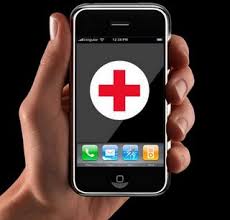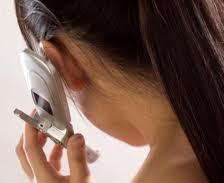
February 28th, 2011 by DrCharles in Opinion, Research
Tags: Artificial Intelligence and Healthcare, Biotechnology, Computers Replacing Doctors, DeepQA, Doctor Patient Relationship, Dr. Watson, General Medicine, Human Doctors, Human Qualities, IBM, Ideal Physician, Jeopardy!, Man Vs. Machine, Mayo Clinic, Medicine and New Technology, Robot Doctor, Robotics, Technology and Society, The Examining Room of Dr. Charles, Virtual Physician Assistants
No Comments »

 After the computer known as Watson easily dispatched of the best two human Jeopardy! contestants in history, IBM announced that one of the first applications of their artificial intelligence technology would be in the medical field. We should soon expect virtual physician assistants in the exam room. At least one of my friends even speculated that the days of human doctors are numbered.
After the computer known as Watson easily dispatched of the best two human Jeopardy! contestants in history, IBM announced that one of the first applications of their artificial intelligence technology would be in the medical field. We should soon expect virtual physician assistants in the exam room. At least one of my friends even speculated that the days of human doctors are numbered.
Is it possible that machines will replace humans in the doctor-patient relationship? I doubt it. According to a study done by the Mayo Clinic in 2006, the most important characteristics patients feel a good doctor must possess are entirely human. According to the study, the ideal physician is confident, empathetic, humane, personal, forthright, respectful, and thorough. Watson may have proved his cognitive superiority, but can a computer ever be taught these human attributes needed to negotiate through patient fear, anxiety, and confusion? Could such a computer ever come across as sincere?
I’m afraid some major calibrations might be needed to substitute artificial intelligence for an “ideal” physician. What do you think? Here’s an artist’s conception (read: farce) of how such an application in the examining room might play out. Click HERE to watch the medical cartoon.
*This blog post was originally published at The Examining Room of Dr. Charles*
February 28th, 2011 by Elaine Schattner, M.D. in Opinion, Research
Tags: Breast Cancer Screening, Breast Imaging Studies, Diagnosis, Diagnostic Imaging, Diagnostic Radiology, Doctor Competence, Doctor Performance, Dr. Elaine Schattner, Experienced Radiologists, False Positives, Hands-On Medical Experience, Mammograms, Mammography, Medical Lessons, National Cancer Institute, NCI, Number of Mammograms Read, Radiology, Specialized Radiologists, Telemedicine, Women's Health
No Comments »

There’s a new study out on mammography with important implications for breast cancer screening. The main result is that when radiologists review more mammograms per year, the rate of false positives declines.
The stated purpose of the research*, published in the journal Radiology, was to see how radiologists’ interpretive volume — essentially the number of mammograms read per year — affects their performance in breast cancer screening. The investigators collected data from six registries participating in the NCI’s Breast Cancer Surveillance Consortium, involving 120 radiologists who interpreted 783,965 screening mammograms from 2002 to 2006. So it was a big study, at least in terms of the number of images and outcomes assessed.
First — and before reaching any conclusions — the variance among seasoned radiologists’ everyday experience reading mammograms is striking. From the paper:
…We studied 120 radiologists with a median age of 54 years (range, 37–74 years); most worked full time (75%), had 20 or more years of experience (53%), and had no fellowship training in breast imaging (92%). Time spent in breast imaging varied, with 26% of radiologists working less than 20% and 33% working 80%–100% of their time in breast imaging. Most (61%) interpreted 1000–2999 mammograms annually, with 9% interpreting 5000 or more mammograms.
So they’re looking at a diverse bunch of radiologists reading mammograms, as young as 37 and as old as 74, most with no extra training in the subspecialty. The fraction of work effort spent on breast imaging –presumably mammography, sonos and MRIs — ranged from a quarter of the group (26 percent) who spend less than a fifth of their time on it and a third (33 percent) who spend almost all of their time on breast imaging studies. Read more »
*This blog post was originally published at Medical Lessons*
February 27th, 2011 by Bryan Vartabedian, M.D. in Better Health Network, Opinion
Tags: 33 Charts, Discussing Mobile Health, Dr. Bryan Vartabedian, Dr. Jay Parkinson, General Medicine, Health 2.0, Health and Smartphones, mHealth, Mobile Health Apps, Mobile Health Technology, Mobile Healthcare Apps, Mobile Medical Apps, Mobile Technology and Health, Questioning Mobile Health, Smartphones and Medical Apps, Youngme Moon
No Comments »

 This is something. Jay Parkinson on the Future Well blog has suggested that health apps are overrated. Then on Twitter came a remark that the post represented “fightin’ words.” While I think the tweet was in jest, I’m sure there are some who will take offense to the less-than-flattering remarks about our coveted health apps.
This is something. Jay Parkinson on the Future Well blog has suggested that health apps are overrated. Then on Twitter came a remark that the post represented “fightin’ words.” While I think the tweet was in jest, I’m sure there are some who will take offense to the less-than-flattering remarks about our coveted health apps.
We love the concept of health apps for what they represent more than for what they really offer us. We want to feel that we’ve got it all in the palm of our hand. After all, technology might do for us what we won’t do for ourselves.
Like Jay I’m underwhelmed, but I don’t think that’ll always be the case. The post’s criticism should start a conversation about what’s real in mobile health and what isn’t. Even the fantasy of Health 2.0 has been questioned, and that’s a good thing. This dialog about reality versus rainbows and unicorns needs to continue.
Youngme Moon in Different: Escaping the Competitive Herd wrote, “The way to keep criticism from devolving into cynicism is to make it a starting point rather than a punctuation mark.” Jay Parkinson’s post is a starting point.
*This blog post was originally published at 33 Charts*
February 26th, 2011 by PJSkerrett in Opinion, Research
Tags: Blood Sugar Levels, Brain Activity, Brain Cancer, Brain Stimulation, Cell Phone Safety, Cell Phone Use, Dr. Nora Volkow, Energy Emission and Brain Health, Energy-Emitting Devices, General Medicine, Glucose Metabolism, Harvard Health Blog, Harvard Health Publications, Harvard Heart Letter, Harvard Medical School, Harvard University, How do I control my blood sugar better, JAMA, Journal of the American Medical Association, Memory, Mental Health, Oncology, Personal Technology and Health, PET scan, PJ Skerrett, Preventive Health, Preventive Medicine, Primary Care, Public Health
No Comments »

 We all know that using a cell phone can stimulate the brain to work a bit harder. “Mr. Skerrett? This is Dr. LeWine’s office. Do you have a minute to talk about your test results?” or “Dad, a bunch of kids are going to Casey’s house after the dance. Can I go?” But a new study published in JAMA is making me wonder what the energy emitted by the phone itself — not just the information it delivers — is doing to my brain.
We all know that using a cell phone can stimulate the brain to work a bit harder. “Mr. Skerrett? This is Dr. LeWine’s office. Do you have a minute to talk about your test results?” or “Dad, a bunch of kids are going to Casey’s house after the dance. Can I go?” But a new study published in JAMA is making me wonder what the energy emitted by the phone itself — not just the information it delivers — is doing to my brain.
Here’s the study in a nutshell. Dr. Nora Volkow and her colleagues recruited 47 volunteers to have their brain activity measured twice by a PET scanner. Both times the volunteer had a cell phone strapped to each ear. During one measurement, both phones were turned off. During the other, one phone was turned on but muted so the volunteer didn’t know it was on; the other was left off. Each session lasted about an hour. The scans showed a small increase in the brain’s use of glucose (blood sugar) when the phone was on, but only in parts of the brain close to the antenna.
It was an elegant study. The researchers took pains to anticipate sources of error. They used a control (both phones off) against which to compare the effect of a “live” cell phone. They used cell phones on each ear, one on and one off, to see if the effect was localized. They muted the phone that was on to eliminate the possibility that any brain activation was due to listening to the sound of a voice coming through the phone’s speaker. So the result is probably a real one, not an artifact or measurement error.
What does this brain activation mean? No one really knows. As Dr. Volkow told NPR, “I cannot say if it is bad that they [cell phones] are increasing glucose metabolism, or if it could be good.” Read more »
*This blog post was originally published at Harvard Health Blog*
February 26th, 2011 by Steven Roy Daviss, M.D. in Health Policy, Opinion
Tags: Acute Psychiatric Care, Bed Board, Canada, Care For Mental Illness, Department of Health and Mental Hygiene, DHMH, Dr. Steven Daviss, ED, Emergency Department, Emergency Medicine, Emergency Room, EMTALA, ER, Hospital Bed Registry, Lack of Inpatient Care, Maryland, Mental Health Services, Mental Health Treatment, My Three Shrinks, No Hospital Beds Available, Ontario, Ottawa Citizen, Psychiatry and Psychology, Shortage of Inpatient Beds, Shrink Rap
No Comments »


I read today that Eastern Ontario has started a bed registry to keep track of where open psychiatric beds are available. This is something I’ve long advocated. The United States now has less than 10 percent of the beds it used to have 50 years ago. Granted, treatment has improved and community resources are enhanced. But there are still areas that often do not have a sufficient number of hospital beds for folks needing acute inpatient psychiatric care.
 The Ontario story described in the Ottawa Citizen states that six of the area hospitals have been connected to a computerized “bed board” that provides real-time information on who has an appropriate bed available. This saves time in the ER and gets patients to needed treatment more quickly. Otherwise calls need to be made to each individual hospital, which is very time-consuming.
The Ontario story described in the Ottawa Citizen states that six of the area hospitals have been connected to a computerized “bed board” that provides real-time information on who has an appropriate bed available. This saves time in the ER and gets patients to needed treatment more quickly. Otherwise calls need to be made to each individual hospital, which is very time-consuming.
And it’s not uncommon for all the beds to be full. Last July there was an EMTALA complaint against a hospital in Maryland because a patient sat in the ER all weekend, and this hospital said they had no beds to admit the patient to. The Department of Health and Mental Hygiene (DHMH) investigated the complaint and found that indeed the hospital was full that weekend. The ER’s record indicated that all the hospitals (except the state hospitals) were called that weekend and all indicated their beds were full. So DHMH visited every hospital (about 28, I think) thinking that surely one of them had an empty bed they were hiding. What they discovered was that every single psychiatric bed in the state was full.
Unfortunately, we have no way of determining how often this happens, but we know if happens often enough. A “bed board” like this would be very helpful in quickly finding beds when needed and keeping track of the extent of this problem. Having patients wait in ER for days is unsafe and is even discriminatory. How many people with stroke or uncontrolled diabetes sit in ER for days waiting to find a bed for treatment? I’d like to hear others’ thoughts on how this problem can be addressed.
*This blog post was originally published at Shrink Rap*
 After the computer known as Watson easily dispatched of the best two human Jeopardy! contestants in history, IBM announced that one of the first applications of their artificial intelligence technology would be in the medical field. We should soon expect virtual physician assistants in the exam room. At least one of my friends even speculated that the days of human doctors are numbered.
After the computer known as Watson easily dispatched of the best two human Jeopardy! contestants in history, IBM announced that one of the first applications of their artificial intelligence technology would be in the medical field. We should soon expect virtual physician assistants in the exam room. At least one of my friends even speculated that the days of human doctors are numbered.


















